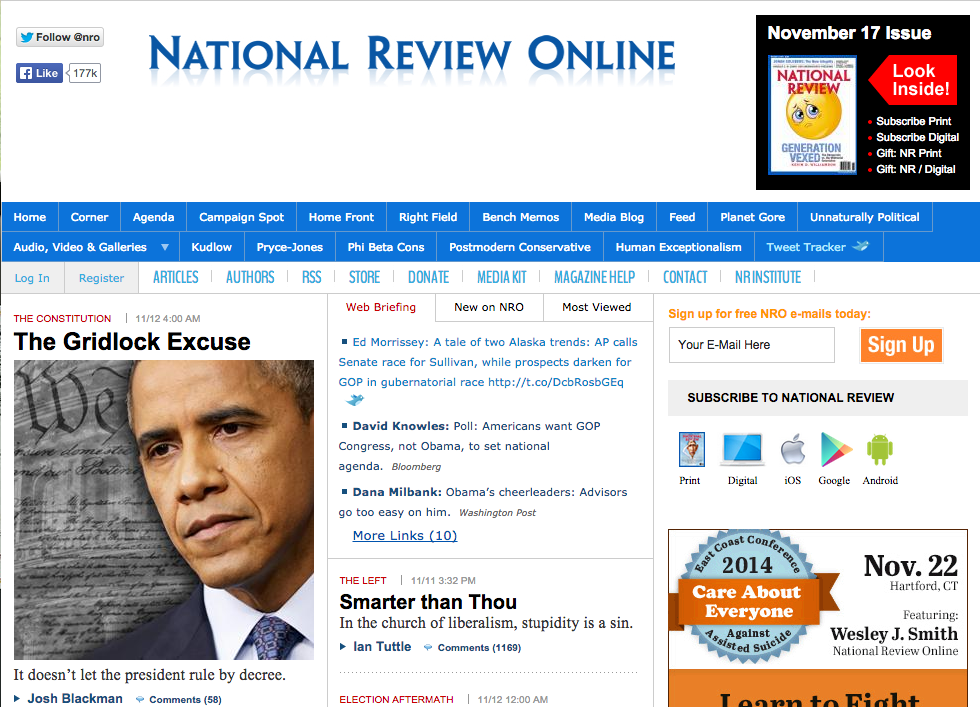National Review has published an updated version of my essay from the September 8 edition, “The Gridlock Clause.” This article is based on my law review article, “Gridlock and Executive Power,” which I plan on submitting for the Spring Law Review cycle.
I revised the essay to include recent developments in the immigration debate, with a focus on DACA and whatever executive action the President has in mind. I try to place Congressional opposition to the President’s plans, and the pursuant gridlock, in terms of Youngstown, and how how it impacts the President’s executive powers. In short, the President’s prosecutorial discretion is at its “lowest ebb” when Congress openly opposes the policy which (arguably) requires statutory authorization.
Here is the introduction:
Since 2010, when the Democrats lost their majority in the House and their filibuster-proof majority in the Senate, President Obama’s ability to pursue legislative changes has ground to a halt. With the Republicans taking control of the Senate in January, we can expect to see many more headlines blaring that the “do-nothing Congress” has passed the fewest laws in decades. But that gridlock hasn’t halted the president’s plans to implement his policies. In fact, he claims it has strengthened his power to act alone — if Congress won’t act, he can, and will.
President Obama routinely cites Congress’s obstinacy regarding his agenda as justification for a series of executive actions that suspend, waive, and even rewrite statutes. His frustration is understandable, but his response is not justifiable. Brazenly maneuvering around the lawmaking function of Congress is an affront to the constitutional order.
Here are the new paragraphs I added concerning immigration, which views prosecutorial discretion along a spectrum of taking care that the laws are faithfully executed. Wide-ranging amnesty, in the absence of statutory authorization, would be an affront to that constitutional duty of the first order.
The administration justified the policy as a reprioritization of immigration enforcement. But the scale of this “discretion,” in the absence of any antecedent legislation for the Dreamers, was unprecedented. There is nothing inherently unconstitutional about prosecutorial discretion; it is virtually impossible for the executive to prosecute all immigration offenses. Beyond logistical difficulties, Congress simply does not appropriate nearly enough funds to deport everyone who is here unlawfully. But there is a stark difference between prioritizing some deportations over others due to administrative concerns and choosing not to enforce the deportation power against a class as a means to adopt a policy that Congress opposed. Prosecutorial discretion exists along a continuum. DACA represented a quantum leap across the spectrum, as a million people whom Congress chose not to protect were protected from the immigration laws. While they were not granted formal amnesty, as a matter of policy, future presidents will be hard-pressed to tamper with their “temporary” status. …
Throughout the summer recess, rumors swirled that the president would grant legal status to many millions more, including relatives of the Dreamers. Ultimately — much to the chagrin of immigrant groups — the issue was not urgent enough to resolve before the election, as that would have put vulnerable Senate races in jeopardy. But now that the president is entering his final two years, with his party controlling neither house of Congress and no momentum for immigration reform, the circumstances are ripe for further unilateral executive action. Recent reports suggest the president will unveil his plan, whatever it is, in December.
If President Obama expands this non-enforcement to five, six, seven, or eight million immigrants, in the absence of enabling legislation and in the face of congressional opposition, it would stand as a repudiation of his oath to take care that the laws are faithfully executed. The chief executive may not frustrate the laws he dislikes simply by choosing not to enforce them — especially when Congress is on record opposing that change. While the vote on the DREAM Act was quite close, blanket amnesty would be a political non-starter. Here, in the words of Justice Robert H. Jackson in the landmark separation-of-powers case Youngstown Sheet & Tube Co. v. Sawyer, the president’s inherent powers are at their “lowest ebb.”
The article is currently leading the homepage of NationalReview.com.
